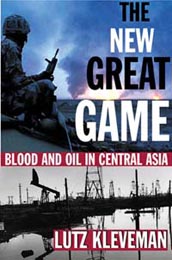People who do not understand or care to study the underlying geological reality behind peak oil often ask, why is it that people from the oil industry deny oil production peaking [1]? Doesn't denial mean that they don't believe in it all [2]? Don't they have the best data to make conclusions [3]?
Answering those three questions isn't as easy as it sounds, but let's make an attempt.
1) Not all oil industry people deny peak oil. In fact a growing number understand and publicly admit it is inevitable. Here's a small sampling:
"We may be sleepwalking into a a problem which is actually going to be very serious and it may be too late to do anything about it by the time we are fully aware." - Lord Oxburgh, ex-Chairman of Shell, on peak oil (Independent, 2007)
"So when Buckee suggests, as he did at Talisman's annual meeting Wednesday, that Peak Oil has arrived." -Jim Buckee, CEO of oil company Talisman Energy, (paraphrased in Canada.com, 2007)
"World conventional oil production will top at c. 84 million barrels per day." - T. Boone Pickens, ex-oil driller, current oil industry investor (Business Week, 2005)
"The precise timing of what people call Peak Oil will really be governed by the actions that all parties, producers, consumers and the industry, choose to take over the coming years." - Tony Hayward, chief executive of BP Group (EAGE Conference, 2007)
"While revealing that the world's peak oil will be reached sometime between 2025 and 2035." - Louis Heuze, General Manager of Total E&P Deep Offshore Borneo BV, paraphrased in an interview (Brunei Weekend Bulletin, 2007)
"A peak in petroleum liquids production, resulting solely from resource limitations, is unlikely in the next 25 years." - R. Vierbuchen, VP of ExxonMobil Caspain/Middle East Region (Houston Geological Society, 2007)
"While other global companies are reluctant to offer predictions on when oil production might peak, Mr. Lund said Statoil's view is that it will come between 2010 and 2015 for the 30 countries in the Organization for Economic Co-operation and Development." - Helge Lund, Chief Executive, Statoil ASA (paraphrased in Financial Post, 2007)
In summary: all
oil companies admit
peak is inevitable, but
disagree publicly (important!)
about the timing of the peak.
2) From above it should be obvious oil companies do believe in oil production peaking. It is a historically known fact for various fields and combined fields of a single countries (US, UK, Mexico, etc). It must be said that they would be foolish to deny it. Reality is based on physical hard sciences, not wishful thinking of the run-of-the-mill economists (e.g. "if we throw enough money at it, we can generate oil out of thin air").
The more interesting question is: do they believe peak oil is imminent (for all practical mitigation purposes within 20 years is imminent)? And even more so: do they think it is a problem?
Here most execs still active in the industry say, it's not a problem and that it is unlikely to happen within 20 years. Jim Buckee, Boone Pickens and investment banker Matthew Simmons are part of the smaller group of people who make the exception.
However, what is telling is that once people leave their official position, they tend to say things they would not have dared to say while in an official position. A good example is Lord Oxburgh of Shell quoted above. Even more interesting are the former high ranking officials of Middle-East national oil companies:
"The big risk in Saudi Arabia is that Ghawar's rate of decline increases to an alarming point. That will set bells ringing all over the oil world because Ghawar underpins Saudi output and Saudi undergirds worldwide production." - Ali Morteza Samsam Bakhtiari, former senior expert of the National Iranian Oil Company (2006)
"The West is deluded to rely on Saudi oil.” - Al-Husseini, former head of exploration and production for Saudi Aramco oil company (2004)
"Kuwait's Oil Minister Sheikh Ali al-Jarrah al-Sabah confirmed on Saturday that Kuwait's proven oil reserves are 48 billion barrels -- a figure conflicting with the previous official estimates of nearly 100 billion barrels." - Sheikh Ali Al-Jarrah Al-Sabah, former oil minister of Kuwait, quoted in People's China Daily (2007)
There appears to be an emerging pattern here. While in power, oil insiders say: "Trust us, there is nothing to worry. Sorry, we will not share our studies or numbers". After they quit (or are sacked), the tune changes: "There's really not that much oil, in fact we are heading into trouble... technology will not help us."
3) Do oil companies then have the best data about their own proven oil reserves and the maturity of the oil fields, both of which together translate into possible production? This is the most difficult question to answer. The reasons are several.
First, oil companies, both national and private, have a long history of distorting their oil reserve data. This has had to do with tax avoidance as well as political game of "mine's bigger than yours"inside OPEC.
Due to this, we can conclude, that the publicly available data is often suspect, sometimes proved to be false and occasionally and outrageous lie.
Now, a more interesting question arises: do oil companies internally know their reserves and production capabilities?
They should. They have the capability. It really makes sense for them business-wise/politically to ensure they have the best data.
Of course, we can't know for sure, but it would make sense that the internal data is more accurate.
Now, the last remaining question, which cannot be answered, remains:
Why is there often a discrepancy between the publicly given data (PR) and the actual reality from the oil fields (the truth), when companies internally really ought to have accurate data (best estimate)?
Without answering this unanswerable question, it seems obvious that the publicly given PR data can be untrustworthy, and unknowably so. In other words, we cannot be sure, when the PR data is the best estimate and when it is just the best distortion of the truth they could come up with.
So, in the end, the critical observer only looks at the data from the field. The real production numbers, real seismic graphs and drill sample analysis.
However, even this is not always enough, as US did exactly that in the 70s, but the peaking of their oil production came as a "big surprise" to many, although not to the experts. So, one must, even with the data available, expect the unexpected when it comes to conventional wisdom. Follow where the data leads you, not wishful thinking or repetitive news headlines.
Matthew Simmons put it into words, when he said:
Look at the data first, then draw conclusions. Not the other way around.
That is the only way to avoid sleepwalking into the crisis. Understand reality, accept limits, find the actual number data, draw conclusions, validate and prepare for the unexpected.

















